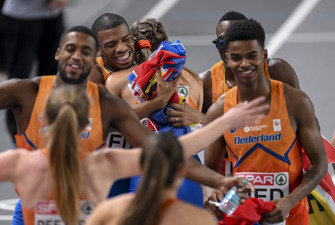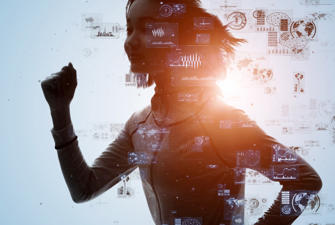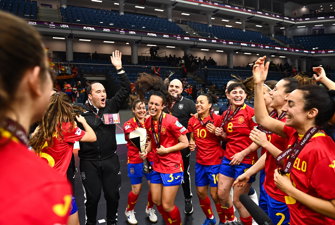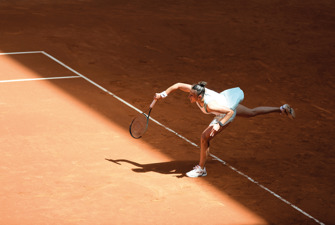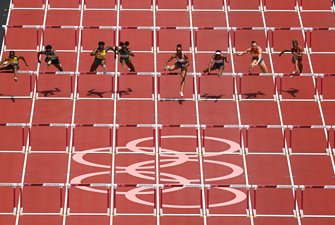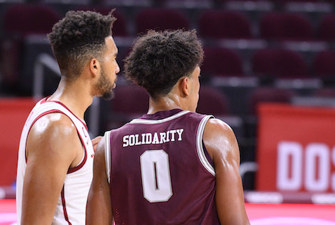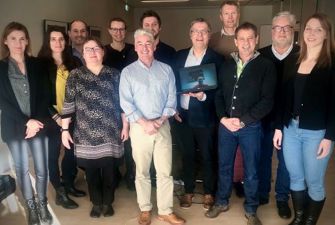Conference showcased many examples of how athletes organise to protect and further their own interests
The 'Strengthening Athlete Power in Sport' (SAPIS) project culminated with a conference to present the findings of its final report, highlighting the landscape as well as the progress and gaps in athlete representation on a day of wider debate about athlete rights and good governance in sports.
Former Olympian and chairwoman of Pentathlon United Kate Allenby set the tone at the conference concluding the project 'Strengthening Athlete Power in Sport' (SAPIS) in Leuven during the European Week of Sport. She detailed how athletes from her sport had rallied under her organisation’s umbrella to get a voice in response to the decision by the International Modern Pentathlon Union (UIPM) to remove the equestrian discipline, which threatens the place of modern pentathlon in the Olympic programme.
Allenby asked: “Are we failing athletes? Is the way we run sports the cause of this decline? The future is one where athletes no longer have to embark on an arduous race to be heard. Pentathlon United’s mission is clear - to empower athletes. They will become what the international federation fears the most - free. What is it about the freedom to speak up that is so threatening to the international federation? In this vision, sports will thrive - not in spite of the athletes but because of them.”
She did not disclose if Pentathlon United may move to a union model in the future to exert even greater influence and represent its members on a vast spectrum of issues but highlighted that ‘freedom’ is about “independent representation.”
Consensus: Sports power lies with athletes
Her viewpoint reflected the broader, general consensus that athletes cannot simply be subjects of sports governance but must be at the heart of decision-making and governance as a fundamental part of modern, democratic sporting institutions.
“The basis of sports power lies with the athletes, it is the same with the labour market, the power lies with workers,” affirmed Frank Hendrickx, a professor of labour law at KU Leuven. “Collective power is the power; the point is to use it and to organise.”
“For us, athletes are at the centre of the sport,” added Katarzyna Biniaszczyk, parliamentary advisor to MEP Tomasz Frankowski and coordinator of the Sports Group in the European Parliament. “They deserve the same respect and rights as other workers in Europe.”
The new SAPIS report is the culmination of an interdisciplinary study that drew on the existing literature as well as interviews and a survey of 146 athlete representatives in 122 different organisations. It found that athlete representation has taken strides in the past decade, but that substantial improvement is still required for athletes to have a proper voice and wield greater influence.
In a major shortcoming, sports federations, however, often do not recognise athlete unions, leaving those at the very centre of the industry - those without whom sports don't exist - in a perilous position, often deprived of their rights or in suboptimal working conditions.
“There is no single model of best representation,” said SAPIS project coordinator Mike McNamee, a professor at Swansea University and KU Leuven.
“One of the crucial things of unions is collective bargaining, which brings economic and political power in a way that the other two forms [athlete commissions and advocacy groups] are unlikely to achieve.”
A powerful example of athlete representation from Spain
The Spanish Women’s Futsal Union (AJFSF) - the biggest players union in the country - serves as a powerful example of athlete representation and a rights-driven association through a singular voice following consultations among the members.
In the past few years, the union has achieved daily allowances for national team players, minimum mandatory professional contracts with clubs and the federation, free Covid-19 tests for all players before matches, and the streaming of all first-division matches. Going from strength to strength, through athlete engagement, the union is working toward a future collective bargaining agreement.
In Spain, players’ rights have come into sharp focus because of Luis Rubiales’ unsolicited kiss during the Women’s World Cup final trophy presentation that led to the downfall of the powerful football administrator after weeks of widespread condemnation and pressure.
“The actual sport must include the independent players and athletes associations in their organisation chart system for good governance,” said the AJFSF chairwoman Natalia Oribe.
“We have to be inside the sports model, there can be no discussion about it. Federations have turned it the other way around, [so that] we depend on them. The federation has direct funding from the government, but for us, they say we have to depend on the members fee,” she continued.
Athletes in Germany and Brazil work on issues and policy reform
In Germany, Athleten Deutschland run an independent athlete association with government funding after overcoming opposition from sporting bodies, who argued that the athletes' commission provided enough representation. To advance the interests of the members, Tarek Elias said that his association is “dealing with the structural imbalance” between the athletes and the governing bodies in the German sporting landscape, always seeking to generate greater legitimacy.
A policy team at Athleten Deutschland advocates for the interests of the 1,800 members in decision-making forums and the association looks to the future by positioning itself on a series of issues, including human rights and integrity, as well as by calling for the establishment of both a centre for safe sport and a national integrity agency.
Further afield, Atletas Pelo Brasil, founded by among others Rai, the brother of the late great Brazilian football player Socrates, takes a different approach, seeking sports policy reform. To that end, the association employs a three-pillar strategy based on research, communication and engagement, and lobbying, in particular of the federal government, congress and the sports ministry. They lobbied, with success, for changes to the Lei Pelé, a general law that regulates sports in Brazil, as well as the sports fiscal incentive law.
The association faces a series of challenges, ranging from participation by members to financing and a general lack of understanding of what sports policy is in an often fragmented environment, but remains loyal to its core mission of athlete representation.
“It is important to know for athletes that they have to participate,” said Rafael Lane, the executive director of Atletas Pelo Brasil. “They have a voice and power. We strategically think with them what to do.”
The different case studies called further attention to the growing role of athletes in their relationship with national and international federations through good practices and democratic engagement, enhancing athlete power.
The project is co-funded by the European Union's Erasmus+ programme with a grant of approximately 251,000 euro.

All publications related to the SAPIS project reflect the views only of the project partners and authors. Neither the European Education and Culture Executive Agency (EACEA) nor the European Commission are responsible for any use that may be made of the information it contains.
